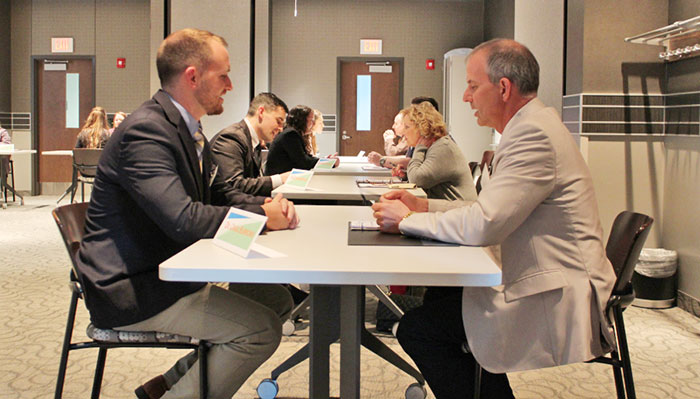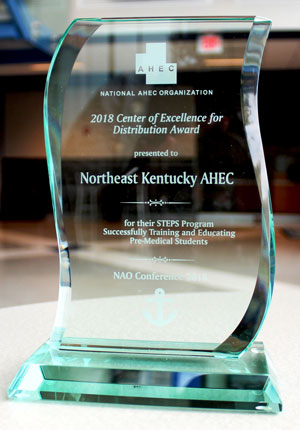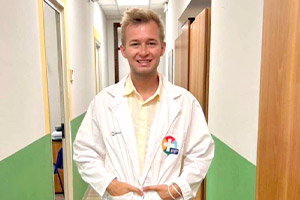Successfully Training and Educating Pre-medical Students (STEPS)
- Need: To increase the number of primary care providers in northeast Kentucky.
- Intervention: STEPS provides support such as physician shadowing, mock interviews, and MCAT practice courses/exams for regional students applying to medical school.
- Results: Approximately 65% of participants have been accepted into medical school. The program has been replicated among most of Kentucky's regional AHECs.
Evidence-level
Promising (About evidence-level criteria)Description

In order to encourage local students to pursue medicine at Kentucky's three medical schools, the Northeast Kentucky Area Health Education Center (NE KY AHEC) created the Successfully Training and Educating Pre-medical Students (STEPS) program in 2013. STEPS supports pre-medical students in the Appalachian region as they apply to medical school.
Through STEPS, the NE KY AHEC partners with the three medical schools in Kentucky, which provide annual county-level data on applicants and matriculants. From 2013 to 2017, STEPS was almost entirely self-funded by the NE KY AHEC. Since 2018, the program and its statewide replication have been partially funded by the Kentucky Primary Care Office.
Services offered
Pre-medical students attending college in northeast Kentucky or with a permanent address in the region are encouraged to apply for the STEPS program. Interested students must complete the following:
- Be enrolled in certain math and science courses
- Complete an online application
- Write a personal essay no longer than 500 words
- Submit a letter of recommendation from a professor
- Complete an in-person or virtual interview
- Have a GPA of at least 3.0

From 2013 to 2022, an average of 13 applicants were selected each year. After the NE KY AHEC received a state contract to expand and replicate STEPS, the number of participants per year was increased to 15 beginning in 2018 and the number of applicants was 21 for the 2019-20 cohort and 20 for the 2020-21 cohort. Once accepted into the STEPS program, participants attend around six meetings, take an online Medical College Admission Test (MCAT) preparatory course, and receive:
- Medical school application tutorials
- Weekly MCAT reviews
- MCAT practice exam(s)
- Mock interviews
- Personal statement writing workshops
- Physician shadowing in multiple specialties
- Other activities that will help pre-medical students prepare for medical school
Results
From 2013 to 2015, a total of 28 students participated in STEPS, 25 of whom met all program requirements. Of these 25 participants, 22 were accepted by a medical school (21 to schools in Kentucky and one to West Virginia); this success rate of 88% exceeded the program's original goal of 70%.

On average, students' MCAT scores were 4.6 points higher than their practice scores. In 2015 and most subsequent years, average MCAT scores have been approximately 7.6 points higher than practice scores.
There were 88 participants in the STEPS program from the 2017-18 cohort to the 2022-23 cohort. Of these 88 students, 51 matriculated to medical school, with fewer than five going out of state. Program organizers attribute part of the lowered success rate during this timeframe to COVID-19, which limited the ability to hold in-person meetings. Additionally, since many of the students' college classes were transitioned online, there could have been some fatigue that reduced the impact of the online MCAT prep trainings. For the 2023-24 cohort to the present, most of the program's components have returned to in-person, such as group meetings, personal statement workshops, and mock interviews.
As further evidence of the STEPS program's success, the NE KY AHEC is now administering its fourth two-year contract (July 2024-June 2026) from the Kentucky Primary Care Office to replicate various aspects of the program among the state's seven other regional AHECs, most of which had no prior pre-medicine preparation programming. After participating in 2018-19, the Northwest AHEC started its own pre-medicine prep program. After an increase in state funding of the Kentucky AHEC Program during the 2022 legislative session, the Southeast Kentucky AHEC initiated its own pre-medicine prep program, bringing the total of regional center pre-med prep programs in Kentucky to six.
Continuation of the statewide MCAT Project allows Kentucky's regional AHECs to track the results of previous years' pre-medicine prep participants. Most students participate as college juniors, so obtaining 2020-25 in-state medical school matriculation data has allowed the AHECs to assess the results of the 2019-24 pre-medicine prep cohorts:
- 173 of 336 pre-medicine prep participants (51.4%) supported by the Kentucky Primary Care Office during 2019-24 matriculated to medical school in fall 2020-25.
- 150 of these 173 matriculants (86.7%) are attending a medical school in Kentucky.
Program coordinators presented STEPS and their county-level medical school data tracking initiative at the 2015 and 2017 National Rural Health Association (NRHA) annual conferences, the 2016 National AHEC Organization biennial conference, and a 2018 HRSA Region IV Workforce Forum. An abstract titled "Development of a Statewide, AHEC-administered Pre-med Prep Project" was presented at the May 2022 NRHA annual conference, in which NE KY AHEC Director David A. Gross was joined by the directors of the Northwest and South Central Kentucky AHECs.

Due to the success of STEPS, the NE KY AHEC was presented with the Center of Excellence for Distribution Award at the National AHEC Organization's 2018 conference. The award recognizes an AHEC program that is improving healthcare workforce distribution throughout the nation, particularly among rural areas and populations.
For more information:
Gross, D.A., Mattox, L.C., & Winkleman, N. (2016). Priming the Physician Pipeline: A Regional AHEC's Use of In-State Medical School Data to Guide Its Health Careers Programming. Journal of Health Care for the Poor and Underserved, 27(4A), 8-18. Article Abstract
Challenges
STEPS coordinators continue to have difficulty filling the slots each year with students only from northeast Kentucky, so they have accepted multiple students from the nearby regional university (Morehead State) who live in other areas. In November 2021, the NE KY AHEC formed a Medical Student Matriculation Working Group in an effort to further increase the number of students from the region who pursue medical school.
In addition to NE KY AHEC staff, members included representatives from Morehead State, regional hospitals, medical schools (including current medical students), and the Kentucky Primary Care Association.
The online MCAT preparatory course costs $2,300 per student. While the NE KY AHEC receives a discount that reduces this figure to $1,300 per student, the remaining cost is still a significant barrier for many. For the 2022-23 STEPS participants and all years forward, the NE KY AHEC has covered the full cost for each student.
Replication
In addition to rolling out the program content, the NE KY AHEC is assisting the other Kentucky AHECs with tracking applicant and matriculant data by county or medical school. This type of data collection can help AHECs determine which counties have the fewest applicants and, in response, target their efforts to encourage more students from these counties to pursue medical careers. Of note, other regional AHECs across the nation are now considering replicating the STEPS model with students pursuing other health professions, such as dentistry, physician assistant, pharmacy, and occupational and physical therapy.
The NE KY AHEC also offers the Summer Health Internship Program (SHIP), which places students in six-week paid internships in local health organizations. This program helps students gain experience in the healthcare field and encourages them to work in the region after graduation.
This 3-minute video features a student's testimonial of the program:
Contact Information
David A. Gross, DirectorNortheast Kentucky Area Health Education Center
david.gross@st-claire.org
Topics
Appalachia
· Health workforce pipeline
· Physicians
States served
Kentucky
Date added
November 29, 2016
Suggested citation: Rural Health Information Hub, 2026 . Successfully Training and Educating Pre-medical Students (STEPS) [online]. Rural Health Information Hub. Available at: https://www.ruralhealthinfo.org/project-examples/938 [Accessed 26 February 2026]
Please contact the models and innovations contact directly for the most complete and current information about this program. Summaries of models and innovations are provided by RHIhub for your convenience. The programs described are not endorsed by RHIhub or by the Federal Office of Rural Health Policy. Each rural community should consider whether a particular project or approach is a good match for their community’s needs and capacity. While it is sometimes possible to adapt program components to match your resources, keep in mind that changes to the program design may impact results.
